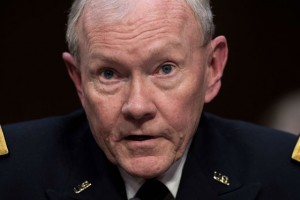Dempsey and Admiral Choi Yoon-Hee “concurred they would watch North Korea’s actions closely in the coming days and would ensure that the US and ROK continue to work closely with one another to deter further North Korean provocations and defuse tensions”.
South and North Korea appeared to take a step back from a looming military clash and agreed to hold top-level talks Saturday, as their respective armies faced off across the border on high alert.
The international community has long experience of North Korea’s particularly aggressive brand of diplomatic brinkmanship, and the last-minute decision for dialogue will confirm for many that this has largely been another exercise in attention-seeking by Pyongyang.
Top-level talks
North and South Korean officials sat down to urgent top-level talks Saturday, seeking some way out of an escalating crisis that has pushed both their militaries to the brink of an armed conflict.
The talks in the border truce village of Panmunjom began shortly after the expiration of a North Korean deadline for Seoul to halt loudspeaker propaganda broadcasts across the border or face military action.
Despite skepticism that Pyongyang would follow through on its threat, the ultimatum raised border tensions to their highest level for years, with the North re-positioning artillery units and South Korean and US fighter jets flying simulated bombing runs.
The dialogue in Panmunjom, where the Korean War ceasefire was signed, offers a chance for both sides to step back, although analysts said finding a workable compromise would be difficult.
Seoul has refused to turn off the loudspeaker broadcasts until Pyongyang apologizes for
mine blasts this month that maimed two South Korean soldiers on border patrol.
North Korea denies any responsibility for the blasts and has accused the South of fabricating evidence of its involvement.
“It’s not easy to see a simple way out where neither side loses face,” said Dan Pinkston, Korea expert at the International Crisis Group in Seoul.
“It’ll be interesting to see if the North can bring something to the table -- possibly a resumption of North-South family reunions -- that will allow the South to turn the loudspeakers off,” Pinkston said.
The four delegates -- two from each side -- include the South Korean president’s national security adviser, Kim Kwan-Jin, and the man widely seen as North Korean leader Kim Jong-Un’s number two, Hwang Pyong-So.
The two men last met in October when Hwang, who is vice chairman of the North’s top military body, the National Defense Commission, led a delegation on the highest-level visit to the South for years.
Those talks ended with an agreement on resuming a high-level dialogue, which never actually got off the ground.
According to South Korea’s presidential Blue House, the request for talks came from the North, despite its aggressive rhetoric and military posturing of recent days.
On the orders of Kim Jong-Un, the North Korean People’s Army (KPA) has been in a “fully armed, wartime state” since Friday, while the foreign ministry in Pyongyang warned Saturday that the situation had “reached the brink of war” and was “hardly controllable”.
The international community has long experience of North Korea’s particularly aggressive brand of diplomatic brinkmanship, and the request for talks will confirm for many that this has largely been another exercise in attention-seeking by Pyongyang.
For the moment, there has been little sense of panic among ordinary South Koreans who have become largely inured over the years to the North’s regular -- and regularly unrealized -- threats of imminent war.
But the military has been on maximum alert, and US and South Korean jets flew simulated bombing sorties around midday Saturday in a clear show of defiance and force.
Thousands of South Korean civilians living on frontline border islands or near military propaganda units were evacuated from their homes to underground shelters as a preventive measure.
Technically, the two Koreas have been at war for the past 65 years, as the 1950-53 Korean conflict ended with a ceasefire that was never ratified by a formal peace treaty.


